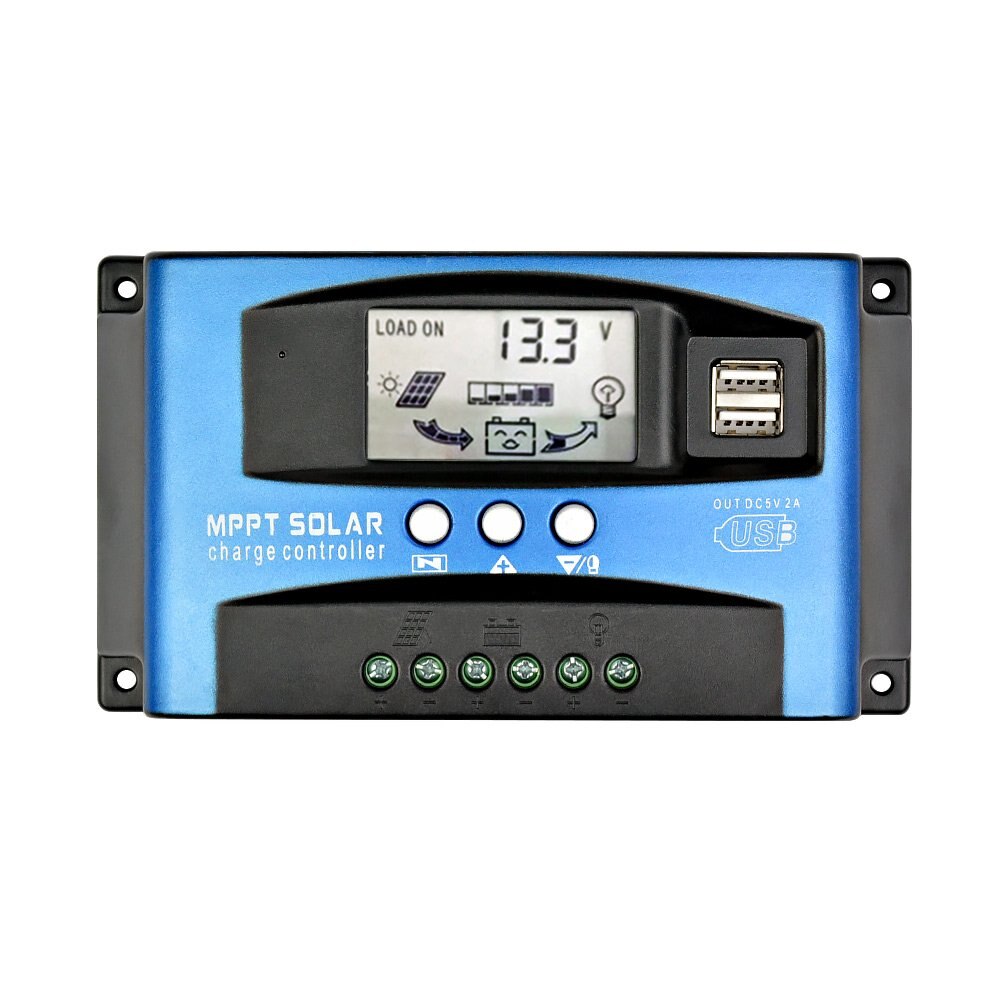Investing in an MPPT (Maximum Power Point Tracking) charge controller for your off-grid battery bank can significantly enhance its performance and longevity.
By maximizing energy harvesting from your solar panels, MPPT technology ensures that your batteries are charged more efficiently and quickly, reducing charging times and improving overall system reliability.
Advanced features such as real-time monitoring and customizable settings provide you with greater control over your off-grid power system, allowing you to optimize its performance and ensure consistent availability of electrical power.
Consider investing in an MPPT charge controller for your off-grid battery bank today to unlock these benefits and improve the return on your renewable energy investment.
Maximum Power Point Tracking
MPPT charge controllers are designed to maximize the power output of your solar panels by tracking the maximum power point (MPP) of the panel under varying environmental conditions. This can result in up to 30% more energy harvesting compared to traditional charge controllers.
These advanced controllers are equipped with sophisticated algorithms and sensors to monitor and adjust the charging voltage and current of your batteries in real-time, ensuring that you maximize the power output of your solar panels.
Traditional charge controllers rely on a fixed voltage and current setup, which can result in significant energy losses and reduced efficiency, especially under varying environmental conditions.
In contrast, MPPT charge controllers constantly monitor the solar panel’s power output and adjust the charging parameters to maximize the energy harvesting.
This intelligent tracking of the maximum power point (MPP) can lead to up to 30% more energy output compared to traditional charge controllers.
Moreover, MPPT charge controllers can adapt to changing conditions such as temperature, irradiance, and panel angle, ensuring that your solar-powered system operates at its full potential throughout the day.
With the ability to optimize energy production, MPPT charge controllers are an essential investment for anyone looking to maximize the efficiency and performance of their solar-powered system.
Improved Efficiency
MPPT charge controllers have higher efficiency rates compared to traditional charge controllers. This means that more energy is transferred from the solar panels to the battery bank, resulting in faster charging and improved system performance.
MPPT (Maximum Power Point Tracking) charge controllers have revolutionized the solar charging industry by providing higher efficiency rates compared to traditional charge controllers.
These advanced controllers are designed to optimize energy harvesting from solar panels, ensuring that the system operates at its maximum potential.
The result is faster charging of the battery bank and improved system performance.
Unlike traditional charge controllers that use a fixed voltage and current to charge the battery, MPPT controllers continuously monitor the solar panel’s voltage and current to determine the optimal charging point.
This allows the controller to maximize energy extraction from the solar panels, resulting in up to 30% higher efficiency compared to traditional controllers.
With MPPT technology, more energy is transferred from the solar panels to the battery bank, resulting in faster charging and improved system performance.
Moreover, MPPT charge controllers can handle a wide range of solar panel voltages and currents, making them ideal for a variety of solar charging systems.
They are also designed to protect the system from overvoltage, overcurrent, and undervoltage conditions, ensuring safe and reliable operation.
MPPT charge controllers offer significant benefits for solar charging systems, including higher efficiency, faster charging, and improved system performance.
If you’re looking for an optimized solar charging solution, consider upgrading to an MPPT charge controller for maximum results.
Compatibility with Multiple Panel Configurations
MPPT charge controllers are designed to work with a wide range of solar panel configurations, making them highly versatile and flexible.
MPPT charge controllers are designed to work with a wide range of solar panel configurations, making them highly versatile and flexible.
Unlike traditional charge controllers that are limited to specific solar panel configurations, MPPT charge controllers can handle a variety of panel configurations, including different voltage and current ratings.
This means that users can easily adapt their solar panel systems to changing conditions, such as varying weather patterns or changes in the battery capacity.
MPPT charge controllers can accommodate different types of batteries, including lead-acid, lithium-ion, and nickel-cadmium, making them ideal for a wide range of applications.
This flexibility and versatility make MPPT charge controllers an excellent choice for anyone looking to build a reliable and efficient solar panel system.
Reduced Heat Generation
MPPT charge controllers are designed to reduce heat generation, which can extend the life of your solar panels and improve system reliability.
Maximum Power Point Tracking (MPPT) charge controllers are a game-changer for solar power systems.
One of their key advantages is heat reduction.
MPPT charge controllers are designed to optimize the power output of your solar panels by tracking the maximum power point (MPP) in real-time, ensuring that your panels operate at their most efficient temperature.
This is especially important in hot and humid environments, where excessive heat can cause solar panels to degrade prematurely.
By reducing heat generation, MPPT charge controllers can extend the life of your solar panels and improve system reliability.
In fact, a study by the National Renewable Energy Laboratory (NREL) found that MPPT charge controllers can increase the lifespan of solar panels by up to 25% compared to traditional charge controllers.
So, if you want to ensure the long-term performance and reliability of your solar power system, consider investing in an MPPT charge controller.
Remote Monitoring and Control
Many MPPT charge controllers come with remote monitoring and control capabilities, allowing you to monitor and control your off-grid battery bank from anywhere in the world.
Many MPPT charge controllers now come equipped with remote monitoring and control capabilities, allowing you to keep a close eye on your off-grid battery bank from anywhere in the world.
With the use of a smartphone app or web-based platform, you can monitor your system’s performance in real-time, receiving updates on battery levels, charging and discharging currents, and other important metrics.
You can also control various aspects of your system remotely, such as adjusting charging settings, turning on and off specific components, and receiving alerts for low battery levels or other issues.
This means that even if you’re not on-site, you can still ensure your system is running smoothly and make any necessary adjustments to maintain optimal performance.
This feature is particularly useful for off-grid battery banks that are located in remote areas, as it allows you to keep a close eye on your system and make any necessary adjustments from the comfort of your own home.
Automatic Charging and Discharging
MPPT charge controllers can automatically adjust charging and discharging rates based on the state of charge of your battery bank, ensuring that your batteries are always fully charged and ready to use.
MPPT (Maximum Power Point Tracking) charge controllers are a game-changer for off-grid battery systems.
These intelligent controllers automatically adjust charging and discharging rates based on the state of charge of your battery bank, ensuring that your batteries are always fully charged and ready to use.
Unlike traditional charge controllers, which simply switch on and off based on a predefined voltage threshold, MPPT controllers continuously monitor the battery’s state of charge and adjust their output to maximize charging efficiency.
This results in faster charging times, improved battery health, and extended system lifespan.
MPPT controllers can also adjust discharging rates to prevent over-discharge and maintain battery health.
With MPPT technology, you can rest assured that your off-grid battery system is always running at peak performance, providing you with reliable power when you need it most.
Low Battery Protection
MPPT charge controllers are designed to protect your battery bank from low voltage and deep discharging, which can extend the life of your batteries and improve system reliability.
MPPT (Maximum Power Point Tracking) charge controllers are an essential component of any battery-powered system, designed to protect your battery bank from low voltage and deep discharging.
These controllers ensure that your batteries are charged optimally, maximizing their lifespan and system reliability.
MPPT technology tracks the maximum power point of your solar panels or wind turbines, adjusting the charging voltage and current to optimize the charging process.
By doing so, it prevents low voltage and deep discharging, which can cause premature battery aging and reduced performance.
MPPT charge controllers also provide overvoltage protection, preventing damage to your batteries and other system components.
With their advanced features and precise control, MPPT charge controllers are essential for any battery-powered system seeking optimal performance, longevity, and reliability.
Scalability
MPPT charge controllers can be easily scaled up or down to meet your changing energy needs, making them a cost-effective solution for off-grid battery banks of any size.
MPPT (Maximum Power Point Tracking) charge controllers are a critical component in any off-grid battery bank system, and they offer unparalleled flexibility and cost-effectiveness.
Unlike traditional charge controllers that are limited to a fixed output voltage and current, MPPT charge controllers can automatically detect and optimize the power point of the solar panels, maximizing the energy harvesting and minimizing losses.
This means that MPPT charge controllers can be easily scaled up or down to meet your changing energy needs, whether you’re powering a small off-grid cabin or a large commercial installation.
Moreover, MPPT charge controllers are designed to work with a wide range of solar panel technologies and battery types, making them a versatile and future-proof solution.
They also offer advanced features such as automatic voltage regulation, overcharge prevention, and low-battery cutoff, ensuring that your off-grid battery bank system is safe and reliable.
MPPT charge controllers are generally more efficient than traditional charge controllers, resulting in higher energy yields and reduced energy loss over time.
MPPT charge controllers offer a cost-effective solution for off-grid battery banks of any size, providing unparalleled flexibility, efficiency, and reliability.
Whether you’re designing a new system or looking to upgrade an existing one, MPPT charge controllers should be at the top of your list.
Want More? Dive Deeper Here!
Hey there! If you’re the type who loves going down the rabbit hole of information (like we do), you’re in the right spot. We’ve pulled together some cool reads and resources that dive a bit deeper into the stuff we chat about on our site. Whether you’re just killing time or super into the topic, these picks might just be what you’re looking for. Happy reading!






